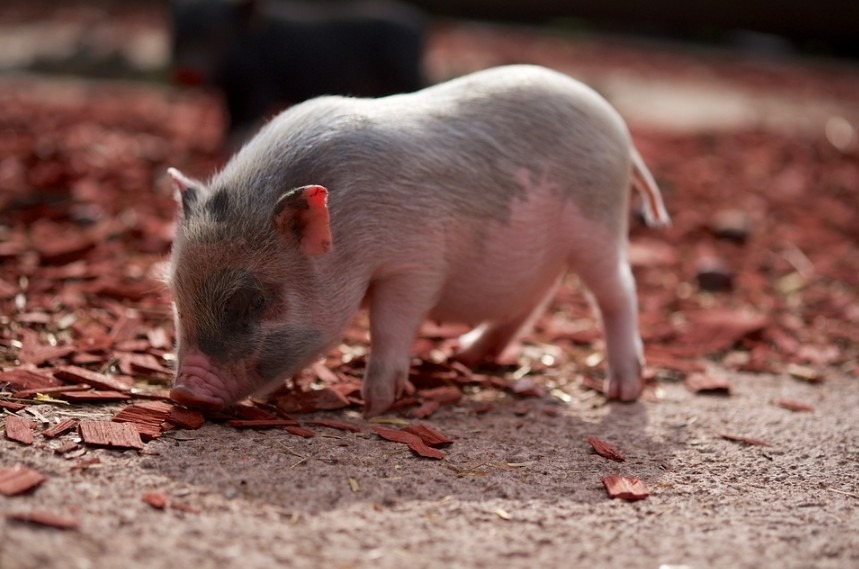Owning any pet is a serious responsibility, but sharing living space with a pig comes with unique challenges. Some of us may be ideally suited to take on such challenges. Others may find that a less demanding animal is a better match for them.
If you are contemplating adopting a pot-bellied pig, make sure to weigh the pros and cons first. Factors such as behavioral tendencies, housing and feeding requirements, and the health issues associated with this breed are all important details to consider.
Behavior and Temperament
On average, pot-bellied pigs in a domestic environment have a life expectancy of 12 to 18 years. Some may even live to be 20 years old. Thus, it is vital that their caretakers have the time and patience to handle these highly intelligent beasts.
Because pigs are so smart, they may be just as trainable as some breeds of dogs. They can be taught to walk on a leash, and they can adapt quite well to living in a house. Also like dogs, pigs have the capacity to perform tricks.
This same intelligence level may also result in a pot-bellied pig being difficult to manage. While these animals are generally playful and inquisitive, they can grow bored and frustrated relatively quickly. They may become destructive if they are not given enough mental stimulation.
Pigs are sometimes stubborn, and they can also be sensitive if treated with impatience. Much like children require boundaries and gentle discipline to thrive, pigs also need to be guided firmly, but with compassion. Punishing a pig is not typically an effective strategy. To teach a pot-bellied pig to adhere to boundaries, the best method is positive reinforcement.
Housing
Housing should always be a top consideration when we choose to take in a pot-bellied pig. We know that many apartment dwellers are animal lovers with big hearts and good intentions. It may be tempting for someone to take in an adorable baby pig as a rescue. What countless people don’t realize is that even a small pot-bellied pig can grow to be 100 to 170 pounds as an adult. This means that even a spacious apartment or condo is not appropriate for such an animal.
If you wish to take on the responsibility of caring for a pig, you must ensure that you have the capacity to house the animal legally. Therefore, when planning housing for a pig, it’s important to know the zoning laws and restrictions for the intended location. Miniature pigs are sometimes allowed to be used as companion animals. Consequently, some zoning laws may have been changed to reflect this trend in recent years. Regardless, you should obtain written documentation of the local zoning ordinances in your area.
The next step is finding a proper home for your pot-bellied pig. Renting or leasing property is generally not advisable for a pig owner. If you choose this route, you will be vulnerable to the decisions made by the property owner. You could be forced to uproot your animal at any time, and quickly finding a new place and relocating with a pig can be stressful.
Because personalities vary among individual pigs, some of them enjoy being indoors and others don’t. If your adopted pig does like to spend time in the house, you will still need to set up a suitable area outside the house. Pigs need to be outdoors for at least part of every day. While out there, your pig will also require some shelter from the elements. Comfortable bedding and a secured environment are essential, as well. Because pigs cannot sweat, you should also provide a wallow or a pool where your pot-bellied pig can stay cool in hot weather. If you are concerned your pot-bellied pig may get away from you when outdoors, pet trackers can help provide peace of mind for you and your family.
If your pig prefers to spend its evenings indoors, make sure that your house is “pig-proofed.” Keep toxic products stored safely away from your adoptee. This may include medications, cleaning products, and plants that are poisonous to pigs. Pigs are strong and clever, with a powerful sense of smell. Thus, you should keep drawers, cupboard doors, closet doors, and pantry doors latched with childproof locks, and you may also need to do this with your refrigerator door.
Feeding
A major aspect of properly caring for your pig is making sure it gets a balanced diet. Foods to avoid include processed foods intended for humans, such as cookies, chips, dried fruit, nuts, and canned vegetables. You should also refrain from giving your pot-bellied pig access to products intended for other animals, such as dog food or cat food.
Ideally, you should provide your adoptee twice daily with a high-quality feed made specifically for pigs. You should also supplement this product with fresh, leafy greens and fresh, low-calorie vegetables, such as celery, cucumbers, and carrots. Since pigs also enjoy eating hay, you can add oat hay or Timothy hay to its diet. The amount of food that you give your pig should reflect how much activity it gets, as well as its size and age. Older pigs require fewer calories than nursing pigs and younger, more active piglets. In the wild, it is natural for a pig to forage for its meals, so you must create an environment that supports this vital instinct. Scatter food in the yard for your pig to search for and consume. In addition to making your pig feel at home, rooting for its food helps the animal to derive essential minerals from the dirt.
Health Problems
When pigs receive the care they require, they generally don’t have many health problems. However, there are some potential issues that a prospective pig owner should know.
Pigs can manifest health problems if they are allowed to remain sedentary or to overeat. Consistent inactivity can lead to stress and obesity. In fact, obesity is a top factor associated with health issues and mortality in pigs. Like humans, morbidly overweight pigs can develop respiratory conditions and joint problems. They can even suffer from a kind of blindness as a result of obesity. This issue occurs when their excessively fatty skin folds obscure their vision.
Another health problem to be aware of is impacted bowels from constipation. This condition can lead to fatality. It is critical to ensure that your pot-bellied pig always has plenty of fresh, clean water to drink, in addition to the recommended high-fiber food plan. Adequate hydration can also help to prevent urinary tract issues for male pigs. Along with giving your pig enough fresh water to drink, you can add water to its pellets for added hydration. This is vital all year long, and it can be even more critical during the hottest months.
You should also discuss other common issues with your animal’s veterinarian. Spaying and neutering are important, as are de-worming and vaccinations. Also, consult the vet about trimming your pig’s tusks and hooves.
The Pros and Cons of Owning a Pot-Bellied Pig
Adopting any animal is a responsibility that should not be taken lightly. Before you commit to owning a pot-bellied pig, you should seriously weigh the pros and cons:
The Pros: Pigs are very intelligent beasts. Once they have established a sense of trust with their humans, they may also be quite affectionate and playful. They are highly trainable, and caring for them can be a lot of fun. Pot-bellied pigs are very communicative and expressive animals, which can be delightful for the entire household.
One of the top benefits of adopting a pot-bellied pig can be a deep sense of gratification. If you have the personality traits and the means to care for one of these creatures, it could be one of the most rewarding experiences of your lifetime!
The Cons: Pigs can be emotional and sensitive, making them relatively high-maintenance pets. They are very curious, so they need to be matched to an owner with the time and patience to discipline them compassionately. They have specific housing and feeding requirements that could inhibit an owner’s lifestyle. If they don’t get the care they need, they may develop debilitating health problems. Those health conditions can also be costly in terms of medical treatment.
Rooterville is one of the best animal sanctuaries dedicated to the care of many animals. We have helped a broad assortment of animals over the years, but we originated as a safe haven for pot-bellied pigs that had been abandoned or abused. We have more than 30 acres and an experienced team to provide a safe, nurturing, and appropriate environment for various animals.
If you admire pigs for their intelligence and personality, but you can’t own one for any reason, there is another wonderful option! You can adopt a pig symbolically instead. Call us at (386) 661-2287 for more information on our adoption program and other ways to get involved.

